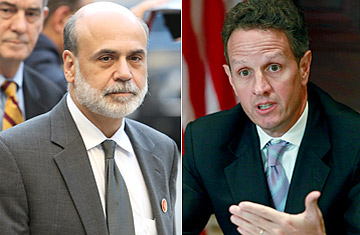
From left: Federal Reserve Chairman Ben Bernanke and Treasury Secretary Tim Geithner
Not even an economic recovery can stop the bank bailout.
Last week, Federal Reserve Chairman Ben Bernanke said the recession is probably over. But that hasn't halted the Treasury Department from continuing to dole out billions of dollars to financial firms. The latest installment came two weeks ago, when the Treasury sent nearly $75 million from the Troubled Asset Relief Program (TARP) to five banks. Community Bancshares of Mississippi was the largest recipient, getting $52 million in federal funds. All told, the government has spent nearly $5 billion in rescue funds in the past three months. Many of the recipients have been small banks.
Some see this as a smart move. Last week, Senate majority leader Harry Reid, a Democrat from Nevada, sent a letter to Treasury Secretary Timothy Geithner urging him to consider giving TARP funds to more small banks, even those that might fail without government assistance. "Comparatively modest assistance from the government now could make a significant difference to these banks, their customers, and their communities, as well as help ensure the fledgling recovery we are seeing in our economy continues," wrote Reid.
But the government's continued assistance to the financial sector comes at a time when the prospects of many banks are improving and most economists believe the financial crisis has largely ended. Earnings at a number of large banks are rising again, and some smaller banks have been able to raise money on their own. Since the end of June, at least 15 small or regional banks have together raised more than $1 billion in stock offerings, without the assistance of the government, according to research firm SNL Financial. Some banks have already paid back the money they got from the government with interest. That's raised the question of why the Treasury's signature financial-assistance program is continuing.
"There was never a good economic rationale for bailing out smaller banks," says Vincent Reinhart, a fellow at the American Enterprise Institute and a former top Federal Reserve economist. "Extending the program only compounds the mistake."
What's more, many of the banks getting money now appear to be in fine financial shape. U.S. Century Bank, for example, boosted its net interest earnings, a key measure of profitability for banks, nearly 20%, to $12.6 million, in the second quarter of this year. Yet in early August the government decided to send the bank $50.2 million in TARP funds. U.S. Century executives say they plan to use the money to increase lending and boost profits. "The banks that are getting the TARP money now really don't need it," says Steve Verdier, who heads government affairs for the trade group Independent Community Bankers of America. His organization favors extending TARP funds to banks that are struggling but not about to fail.
The Treasury Department says the TARP funds were never meant to solely prop up failing banks. In fact, officials say one of the criteria for getting funds under the TARP's Capital Purchase Program, in which the government injects money into a bank in return for preferred shares, is proof that a bank could survive on its own. While the Treasury is winding down some of its programs meant to assist the financial sector, it has no plans to end the TARP program early. The Treasury Department says it is still getting new requests from banks for TARP funds. (Small banks have until Nov. 21 to apply to get TARP funds.)
Earlier this year, Geithner gave a speech promising more assistance from TARP to smaller banks. Treasury officials say the Obama Administration has placed an increased emphasis on using TARP funds to ensure the strength of smaller banks. "The Capital Purchase Program expansion for small banks is helping to stabilize the economy, support small businesses and get us on a path to recovery," says Treasury spokeswoman Meg Reilly.
Banking-industry consultant Bert Ely says he was never a big fan of TARP. But now that it is in place, he thinks there are benefits to keeping it going. The biggest could be to encourage stronger banks to buy up failing financial firms that continue to be a strain on the system. "To me that seems to be a legitimate use of TARP funds," says Ely. "There are still a lot of weak banks out there."
